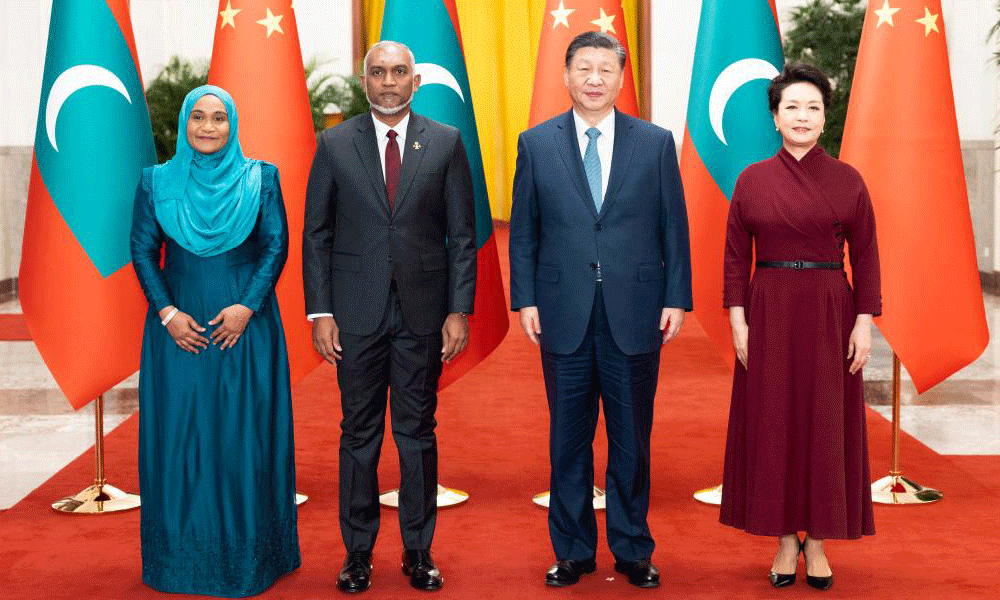Maldives-China Alliance: A New Headache For India?
Chowdhury Taoheed Al-Rabbi, student of BUP
Published: 21 Jan 2024

Chinese President Xi Jinping and his wife Peng Liyuan hold a welcoming ceremony for President of the Republic of Maldives Mohamed Muizzu and his wife Sajidha Mohamed in the Northern Hall of the Great Hall of the People prior to the talks between Xi and Muizzu in Beijing, capital of China, Jan. 10, 2024. Xi held talks with Muizzu, who is paying a state visit to China, in Beijing on Wednesday. Photo : Xinhua
Maldives President Mohamed Muizzu visited his Chinese counterpart Xi Jinping on 11 January 2024 and the pair signed 20 agreements to bolster bilateral ties between the two countries. In addition, Muizzu also requested Xi to send more tourists to Maldives, as the recent tensions with India have reached an all-time high. Muizzu anticipated the fact that India is more likely to urge its citizens not to go to Maldives as tourists and instead travel to the Lakshadweep archipelago that is in the vicinity of India.
With the ‘#BoycottMaldives’ trend surging in India, the South Asian giant will look for ways to make Lakshadweep a tourist hotspot. However, after years of investing in the Maldives, can a sudden shift in policy indeed be beneficial for India in terms of economic outcomes? And is the Maldives-China alliance a geopolitical victory for China? How did these events unfold in such a short period?
Mohamed Muizzu was sworn in as the new president of Maldives on 17 November 2023. Muizzu reiterated several times before being elected that Indian troops stationed in Maldives should leave the country. After being sworn in as the president, Muizzu further pressured India to get its troops out of the archipelago as soon as possible and India eventually agreed to do so.
This can indeed be achieved as a first-stage victory for the newly elected president in his per-dictated foreign policy commitments. However, he also insisted that his administration would “not exclusively align with any single nation”. A good number of political analysts have already described him as a “pro-China figure who wants to reduce Indian influence in the region”.
As with any developing country, diversifying foreign affairs is always a priority and Maldives as a sovereign state has every right to pick up relations with whichever country it prefers. But the problem arose when three Maldivian ministers made derogatory remarks towards Narendra Modi following the latter’s visit to Lakshadweep, labelling the Indian prime minister as a ‘clown’, ‘terrorist’ and a ‘puppet of Israel’. The final remark can be referred to the close ties that India and Israel share.
In any case, India’s relationship with the Maldives - despite reaching a low point - still did not deteriorate that badly until those remarks were made by the three ministers. Muizzu acted swiftly afterwards and dismissed those individuals from their respective posts but the damage had already been done.
Muizzu probably foresaw the dangers of being isolated in South Asia because of India’s influence in the region. But where one door closes, another one opens. The opportunity to align with the second-largest economy came up and the Maldives president made use of it by swiftly allying with Xi Jinping.
However, Muizzu cannot undo all of the economic ties and investments that India has implemented in Maldives over the past couple of decades because doing so would be equivalent to stabbing one’s own foot. The relations between India and Maldives date back to 1966 when the archipelago gained its independence from Britain and India became one of the first countries to recognise its independence. Over the years, India provided military and economic assistance to Maldives. India also sent its military force to suppress a Tamil-backed coup d'état attempt in the Maldives in 1988, known as ‘Operation Cactus’.
But with the passing of years, there was perhaps the rising insecurity among many politicians in the Maldives that the country was gradually becoming a vassal state of India. Even Abdulla Yameen was more pro-China than pro-India. India itself would also be wary of completely disengaging with Maldives since doing so would mean losing a long-time key trading partner.
Despite having a very powerful military, India does have powerful neighbours at its borders - Pakistan and China. Likewise, India’s relations with the US have also not been very smooth over the recent years for different reasons.
Despite all of that, the West – especially the US – does need India to counter the rise of China. So it can be expected that they won’t much pressurize the South Asian powerhouse on the recent accusations. Even so, India still needs to tread carefully when it comes to foreign policies because, after all, the country’s largest export revenues come from the US.
Whatever the case is, one thing is certain - India needs to perpetuate its economic growth and development if it wants to be a global superpower and maintain its sphere of influence in the sub-continent. The recent split in its relations with Maldives can be a good wake-up call for the country to focus on that path by finding the right balance between the Eastern and Western blocs.

